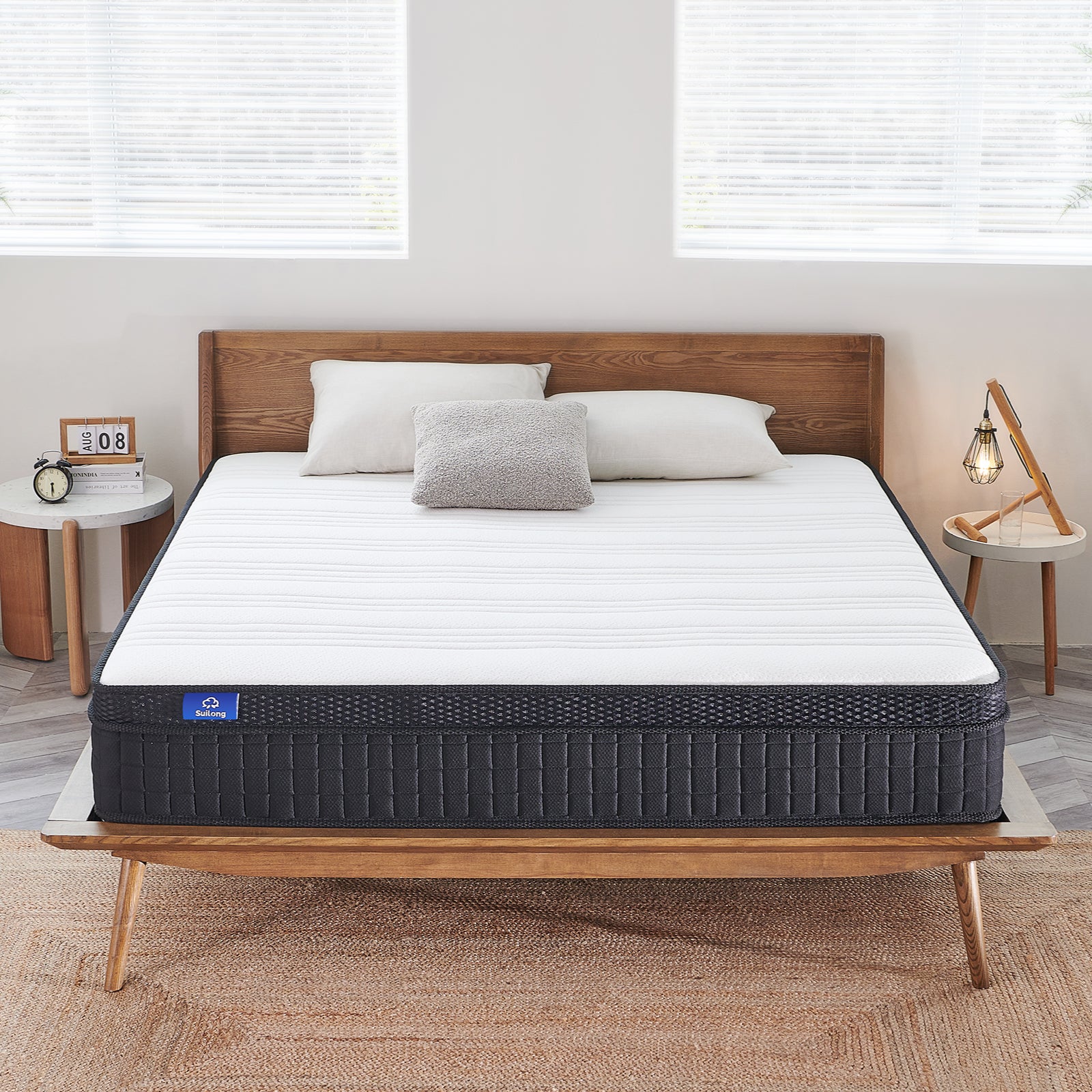Best Mattress Choices for Lightweight Sleepers

Best Mattress Choices for Lightweight Sleepers: A Comprehensive Guide
In today's digital world, every keyword we search for reflects a unique need. When you type in "how to choose a mattress for skinny people", it probably represents your quest to find the right sleep solution for you or your family. So why do skinny people really need a specific mattress? It's not just a matter of comfort, but on a deeper level, it's about physical health, quality of sleep and even quality of daily life. Let's delve deeper together.
1. Why do thin people need specific mattresses?
When we talk about mattress selection, it's usually based on comfort and health factors. However, what most people may not realise is that body size and weight actually have a big impact on mattress choice. Thin people have significantly different mattress needs than the rest of the population due to their specific body structure and weight.
The relationship between body weight and mattresses
Mattresses were originally designed to support the body and provide us with a stable and comfortable resting environment. The pressure exerted by body weight on a mattress is a key factor in determining the longevity, comfort and support of a mattress. Thin people exert relatively little pressure on their mattresses due to their lower body weight. This means that in order to achieve the desired level of comfort and support, thin people may need to choose a mattress with a more elaborate design.
Pressure Dispersion and Body Support
Everyone wants a mattress that provides even support for the body. For skinny people, their body curves and joints may be more prominent, which results in the need for the mattress to provide more support and cushioning in specific areas, such as the shoulders, pelvis and lower back. If an unsuitable mattress is chosen, it may not provide enough support to these areas, which can lead to physical pain and discomfort over time.
Material and construction of the mattress
For skinny people, the choice of material and structural design of the mattress is crucial. For example, some high-density memory foam mattresses or latex mattresses may provide better support and comfort for thin people. These materials are able to adjust themselves to the body's temperature and weight, providing personalised support for the body.

2. How do side sleepers choose a mattress?
Side sleepers often face a unique set of challenges when choosing a mattress. Since most of the weight is centred on a few points during sleep, such as the shoulders and hips, it becomes especially important to choose a mattress that provides proper support and comfort for these pressure points.
Pressure points on the body of a side sleeper
When we lie on our sides, there is more pressure on parts of the body such as the shoulders, hips and knees. These pressure points can lead to soreness and discomfort after a long sleep. For this reason, a mattress must be able to provide adequate cushioning in these areas while ensuring that the entire body is evenly supported.
Firmness Considerations
Generally, side sleepers are better suited for a medium to moderately soft mattress. A mattress that is too firm will not provide enough cushioning for the curves of the body and may lead to pressure pain in the shoulders and hips. And a mattress that is too soft may cause the body to sink in, affecting the alignment of the spine.
Choice of material
Memory foam and latex mattresses usually provide good support for side sleepers. They conform well to the shape of the body, reduce pressure points, and provide even support. Memory foam mattresses, in particular, respond to body temperature and pressure to provide customised support for the body.
Mattress thickness
For side sleepers, it's also important to choose a mattress of the right thickness. A mattress that is too thin may not provide enough cushioning, while a mattress that is too thick may cause discomfort to the body. Typically, a mattress thickness of 10-12 inches is a good choice.
Individual differences
Finally, while there are some general recommendations, every person's body and preferences are unique. It is recommended that side sleepers try out a number of different mattresses to find the one that works best for them before purchasing a mattress.

3. Easily distinguish between soft and firm beds
When it comes to mattress firmness, it's not simply a matter of "soft" or "hard". Each type of mattress has its own unique benefits and considerations. For the consumer, a clear understanding of these characteristics will greatly assist in the purchasing decision.
Features and Benefits of Soft Beds
- Fits the body's curves
Soft beds are able to better fit various parts of the body, such as hips, shoulders, etc. This fit provides the body with a sense of well-being. This fit provides a sense of "wrapping" around the body, which helps to relieve pressure points.
- Cushions joints and muscles
For those with sensitive joints or muscles, a soft bed provides enough cushioning to help reduce morning aches and pains.
- Provides deeper sleep
Due to the effectiveness of soft beds in relieving pressure points, some people will find themselves enjoying a deeper sleep in a soft bed.
Features and benefits of hard beds
- Provides stable support for the spine
Hard beds provide firm support for the spine and help maintain the natural S-shape of the spine.
- Reduces deep indentation
Compared to soft beds, hard beds don't make your body sink deeply, which helps reduce the trouble of turning over.
- Improve sleep efficiency
For people who are used to back or stomach sleepers, hard beds can help them maintain a stable posture and improve the overall quality of sleep.

4. Growing older: how do our mattress needs change?
When we talk about mattress choices, comfort and support are usually the first things we consider. But in reality, as we age, our body's needs and expectations of a mattress change. These changes may affect how we choose a mattress and the type of mattress we need.
1. Changes in the body and mattress support
As we age, our joints may become more sensitive and fragile. This means we need a mattress that provides better support to minimise compression. For middle-aged and older adults, especially those who suffer from arthritis, a mattress with good pressure dispersion is a necessity. In addition, the health of the spine becomes a key consideration. As we age, the spine may suffer more wear and tear, which requires good support from the mattress to help maintain the natural curvature of the spine.
2. Thermoregulation and Mattress Breathability
Women entering menopause may suffer from hot flushes or sweating problems and therefore need a mattress with good breathability to maintain a comfortable sleeping temperature. This type of mattress can help disperse heat and avoid overheating.
3. Mobility and mattress height and firmness
Getting in and out of bed may become difficult as you age. Choosing a mattress of the right height can help improve mobility. Also, the firmness of the mattress can affect how easy it is to get in and out of bed.
4. Weight distribution and mattress choice
As we age, our weight distribution may change. This may result in the need for extra support in certain areas, such as the hips or lower back. It becomes especially important to choose a mattress that provides extra support in key areas.

5. How to choose the right mattress for yourself? In-depth analysis!
Choosing the right mattress is not only about the quality of our sleep, but also has a direct impact on the health and vitality of our daily lives. Improper choice may lead to sleep deprivation, back pain or other health problems. So, how should we choose the right mattress for ourselves?
1. Understand your sleeping habits
Different sleeping habits require different mattress support. Side sleepers may need a softer mattress to protect their joints, while back or stomach sleepers may need a firmer mattress to support their spine. I recommend that you spend a week observing your sleeping habits, as this will provide an important reference for mattress selection.
2. Consider the material of the mattress
The material of the mattress directly affects its comfort and longevity. I recommend latex or memory foam because they provide good support and have good ventilation. Avoid hard or non-breathable materials or you may keep waking up during the night.
3. Focus on the thickness and layers of the mattress
A good mattress usually has multiple layers to ensure maximum comfort and support. Consider choosing a mattress that is at least 10 inches thick and make sure it has multiple layers.
4. Brand and reviews matter
Choose a brand with a good reputation. Don't just look at the price, but also the reviews. I recommend checking online reviews, consumer reports or asking friends and family for recommendations to ensure you choose a quality mattress.
https://suilong.org/products/suilong-galaxy-14-inch-luxury-hybrid-mattress
5. Consider budget without sacrificing quality
Of course, budget is always a consideration, but I highly recommend that you don't sacrifice the quality of your mattress to save on expenses. Consider it a long-term investment, and investing in your body and health is definitely worth it.
Choosing the right mattress is really the beginning of everyone's quest for quality sleep. For skinny people, it's even more important to focus on the support and materials of the mattress. I hope this article has helped you understand and find the right mattress for you. Remember, no matter what size your body is, you deserve sweet dreams and a healthy body. Again, choosing the right mattress is the secret to giving you plenty of energy each and every day.
FAQ
Q: Why do lightweight individuals require specific mattress types?
A: Lightweight individuals often don't exert as much pressure on a mattress as heavier individuals. As such, they might find some mattresses too firm, leading to discomfort and pressure points. A specific mattress tailored to their weight can provide the needed contouring and support for a restful night.
Q: Are memory foam mattresses suitable for skinny people?
A: Yes, memory foam mattresses can be ideal for skinny people as they conform to the body's shape, offering pressure relief. However, it's essential to choose a softer version to ensure the foam contours well to the body's shape, ensuring optimum support.
Q: How does sleeping position affect mattress choice for lighter individuals?
A: Just like with anyone else, a lightweight person's sleeping position will influence their mattress choice. For instance, side sleepers might prefer softer mattresses that cushion the shoulders and hips, while back or stomach sleepers might opt for a medium-firm feel for better spine alignment.
Q: Do lightweight sleepers need special bed frames or foundations?
A: While the primary concern is the mattress, the bed frame or foundation can play a role. Lightweight sleepers can opt for slatted, solid, or adjustable bases. However, ensuring the foundation complements the mattress's feel and support is crucial for durability and comfort.
Q: Can lightweight individuals use hybrid mattresses?
A: Absolutely! Hybrid mattresses combine innerspring coils with foam or latex layers, offering both support and contouring. Lightweight individuals should look for hybrids with softer comfort layers to enjoy the benefits of both support and cushioning.
-
Posted in
Buyer's Guide, Choosing the Right Mattress, How to select the right mattress type for a better sleep, Mattress Buying Guide, Mattress thickness, Shopping Tips, Sleep Tips, the type of mattress
















